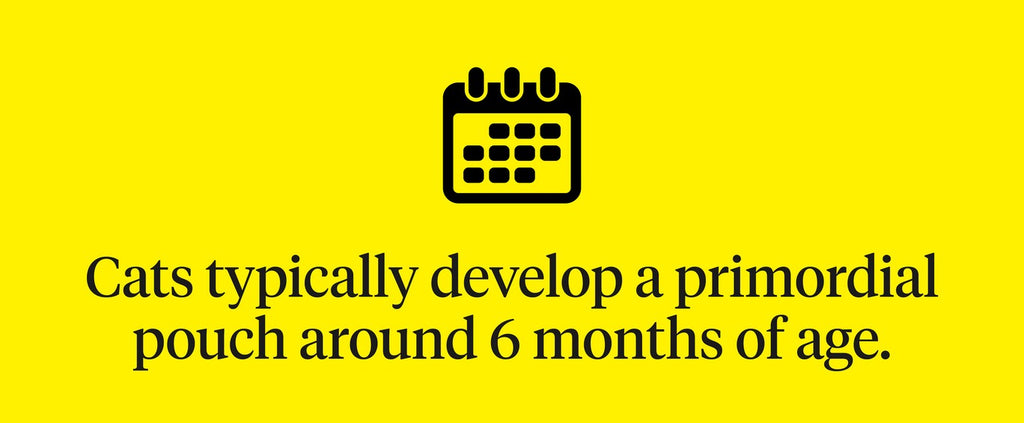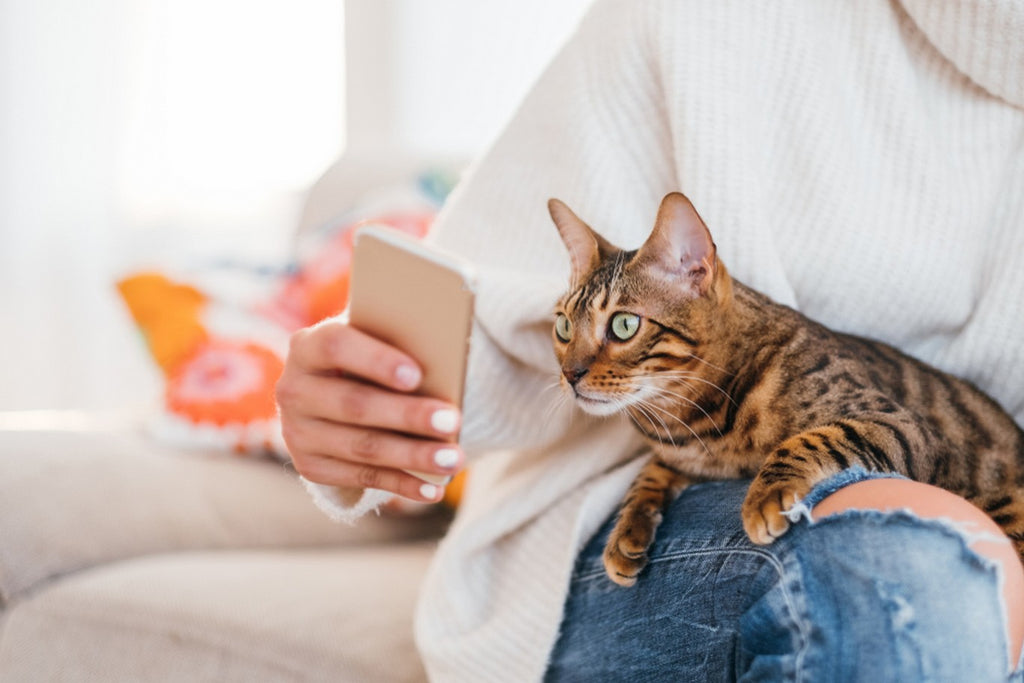8 Min Read
What Is A Primordial Pouch?
Key takeaway

Why pet owners are switching to online vet care with Dutch
-
Prescriptions delivered free to you
-
Fast access to Licensed Vets over video
-
Unlimited video visits and follow-ups
Have you ever noticed your cat has a slightly saggy belly? Some pet parents might think it means their feline friends have gained some weight, but that belly may indicate underlying health issues. All cats have a primordial pouch, the abdominal flap you may notice near their bellies. The primordial pouch is visible on many cats, but some have more pronounced pouches than others. But what are primordial pouches on cats’ bellies, and why do all cats have them?
While pet parents notice them, they don’t seem to give too much thought to them or their purpose; they simply think it’s a cute part of the feline anatomy. However, while every cat has this physical feature, they can become more pronounced if your cat has gained weight or has an underlying health problem. Of course, these pouches vary in size, and you may not even notice them on your cats at first.
Cat pouch bellies are normal, but you may wonder what purpose they serve. This article will discuss everything you need to know about the primordial pouch, including its purpose and what it means when your cat’s belly pouch becomes more pronounced.
- A Cat’s Primordial Pouch (Cat Belly Pouch)
- Why Do Cats Have A Primordial Pouch?
- Reasons Why Your Cat Has A Pronounced Primordial Pouch
- When Should I Be Worried About The Primordial Pouch?
- FAQs
- Final Notes
A Cat’s Primordial Pouch (Cat Belly Pouch)
Primordial pouches are made of fur, skin, and fat. This protective layer varies in size, depending on the cat. Some cats have small pouches, while others are more noticeable.1 Primordial pouches may also be more prominent on older cats, but every cat has one.
If you raised your cat from a kitten, you might have noticed they didn’t have a pouch when they were young. So, when do cats develop primordial pouches? Typically around six months of age, you’ll be able to see their pouch.

Why Do Cats Have A Primordial Pouch?
While it’s largely unknown why cats have primordial pouches, many popular theories exist. Here are a few reasons why cats might have a primordial pouch:
Protection
One of the most recognized theories about why cats have a primordial pouch is that it serves as protection.1 In the wild, cats may attack one another at the belly, so the pouch can protect their internal organs from being punctured. While your cat may be an indoor cat, they may still engage in fights with other cats in the home. Cat conflicts can ensue over toys, territories, and food, so your cats’ primordial pouches may serve as protection from their siblings.
Flexibility
Another popular theory is that the primordial pouch offers better flexibility in the stomach, allowing it to stretch as the cat runs and jumps to catch prey or run from predators.1 While your domesticated cat may not be hunting for prey, they still use their primordial pouch on a daily basis to run, jump, and play.
Storage
Another theory is that the primordial pouch provides a cat with additional storage for when they eat large meals. Since wild cats don’t get to eat as often as house cats, their primordial pouch allows them to eat as much as possible when they can to store fat from a hunt.1
Reasons Why Your Cat Has A Pronounced Primordial Pouch
As we’ve already discussed, every cat has a primordial pouch. However, some are more pronounced than others. The size of the primordial pouch varies by cat and several other factors, including:
Breed
Some breeds are known for their larger primordial pouches, including the Bengal cat, Pixiebob, and Egyptian Mau.1 However, it’s not known why some breeds have more pronounced pouches than others.
Age
Cat pouch bellies become more noticeable as they age because the skin loses elasticity, causing it to sag more than in healthy cats. So while you might notice your cat’s primordial pouch more after they’ve started to reach old age, it’s usually nothing to worry about unless they start gaining too much weight.

Pregnancy
During pregnancy, a female cat’s primordial pouch may hang more to accommodate the fetus. If your cat isn’t spayed, they could become pregnant if they slip away from home one day. If you believe your cat is pregnant, you should avoid touching their primordial pouch and contact your vet for an examination.
Spaying and neutering your cats won’t prevent a larger primordial pouch, but spaying can prevent pregnancy in females, leading to a larger cat belly.
Obesity
Obesity is another common reason why your cat has a large primordial pouch. If your cat is gaining weight, their belly will enlarge, causing the primordial pouch to hang closer to the floor, making it more pronounced. Obesity isn’t usually something wild cats have to worry about because they don’t have access to food all day, every day. However, house cats can easily become obese by overeating.
If your cat’s primordial pouch has only recently started drooping, it could indicate a weight problem. Look for other signs your cat is obese or overweight, like difficulty moving, playing, and jumping. You can also touch your cat’s sides and stomach to feel their fat to determine whether or not they’re overweight. You should be able to feel your cat’s ribs, but if you can’t and instead notice a layer of fat, it could indicate a weight problem. Obesity must be taken seriously since it’s associated with other health concerns, including arthritis, diabetes, and pancreatitis in cats.2
If you suspect your cat is overweight, you can weigh them yourself or take them to a veterinary clinic where you’ll have access to a professional who can devise a treatment plan to help your cat lose weight.
When Should I Be Worried About The Primordial Pouch?
In most cases, there’s no reason to worry about your cat’s primordial pouch unless they’re experiencing signs of distress. Every cat has a primordial pouch, but some breeds have more pronounced pouches than others. Therefore, if you notice your cat’s belly sags more than another’s, it’s usually nothing to worry about unless your cat is pregnant or has recently gained weight.
That said, you can still learn a lot about your cat’s health by looking at their stomachs. For example, if your cat’s primordial pouch has recently become larger, it could indicate pregnancy in unspayed female cats. In addition, if you feel a lump on your cat, it could indicate tumors. If there’s no chance your cat could be pregnant, it’s safe to touch your cat’s abdomen to feel their belly pouch for potentially dangerous signs of illness that may accompany symptoms like lethargy in cats.
However, if your cat has received a clean bill of health from the vet and isn’t experiencing any signs of illness, there’s likely no reason to worry about your cat’s belly pouch.
FAQs
Does a primordial pouch mean my cat is overweight?
A primordial pouch does not necessarily mean that your cat is overweight. All cats have belly pouches, but some have larger ones than others, depending on their age and breed. Healthy cats still have primordial pouches. However, if your adult cat’s belly pouch starts to get larger, it could indicate that they’ve gained weight.
Luckily, there are many ways to determine whether your cat is overweight. You can either find out how heavy your cat should be from your vet and weigh them regularly or touch their abdomen with your hand to see if you can feel ribs. You can also look at your cat from above; an overweight cat will appear more round and will not have a well-defined waist.
What other animals have a primordial pouch?
Domestic cats aren’t the only animals with primordial pouches. Wild cats, such as lions and tigers, have these same pouches for the same reasons.1 Still, cats are the only animals to have primordial pouches, making them unique.
What should I do if my cat has a primordial pouch?
All cats have primordial pouches, so there’s no reason to worry unless your cat has an underlying health problem. Cats typically develop primordial pouches at six months of age and will have them for the rest of their lives. However, you may notice your cat’s belly pouch changing over time. Older cats have more pronounced pouches, and so do obese and pregnant cats. Therefore, throughout your cat’s life, their belly pouch might change.
That being said, the primordial pouch may be able to tell you about your cat’s health. Since it becomes more pronounced when cats are obese, it may be a sign that your cat has gained too much weight. Of course, if you believe your cat is pregnant or overweight, you should have them examined by a vet who can help you determine the proper treatment or care plan to ensure your cat’s health and wellness.

Final Notes
A cat’s belly pouch is not a cause for concern in healthy cats because all cats have them. Primordial pouches are a normal part of all cat’s bodies. However, changes in the primordial pouch can indicate an underlying health concern. For example, lumps could alert you to a health issue. Meanwhile, a more pronounced pouch that develops over time could indicate obesity.
Talk to a Dutch vet when you’re worried about your cat’s health. We can help you determine whether a cat’s primordial pouch may indicate a more serious health concern to ensure their health. Whether you’re wondering how to prevent stress in your meowing cat or why your cat sleeps so much, or you’re concerned about their weight, Dutch can help. Our licensed vets are available to answer your questions any time of day or night to help you become a better pet parent.
Share
References
-
Beltran, Isabella. “Cat's Primordial Belly Pouches-- What Is It for?” Science Times, 11 Apr. 2021, https://www.sciencetimes.com/articles/30596/20210410/cats-primordial-belly-pouches-what.htm.
-
Santora, Tyler. “Why Do Cats Have Belly 'Pouches'?” LiveScience, Purch, 4 Oct. 2021, https://www.livescience.com/cats-primordial-pouch.html.

